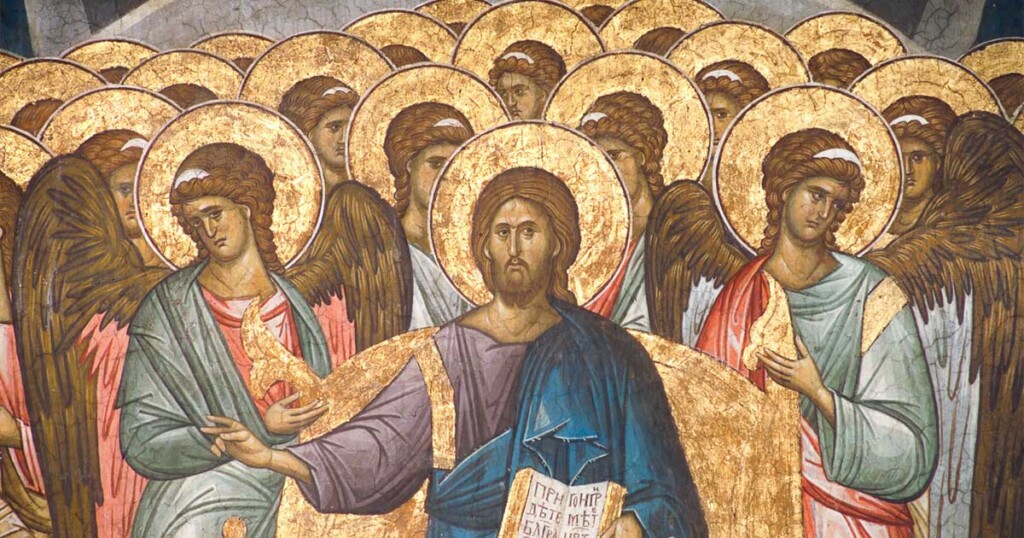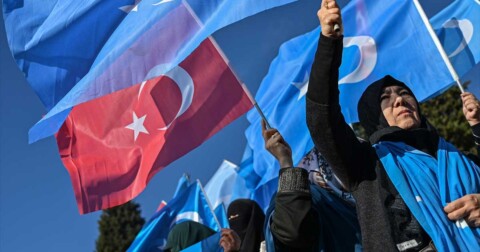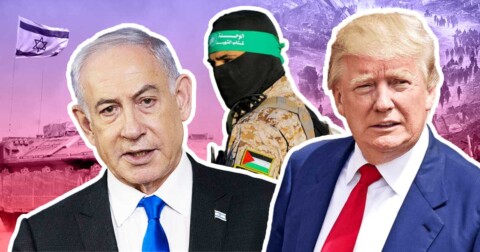What is happening across the world when it comes to the Orthodox?
A serious and determined persecution of the Orthodox has been launched on all fronts.
The faithful of the Jerusalem Patriarchate are suffering in the war of extermination that Israel is waging against the Palestinians.
The Monastery of Saint Catherine on Mount Sinai—whose protection was once promised by the Islamic leader Muhammad himself—is now under threat of property confiscation by the Egyptian state.
The Antiochian Church, one of the oldest Orthodox patriarchates in the world, has been under bloody assault for over a decade and a half from Islamic extremism, which kills its believers and destroys its churches and monasteries. Most recently, on June 22, 2025, a massacre was carried out in the Church of Saint Elijah in Damascus by an Islamic terrorist—a suicide bomber.
In Ukraine, the Ecumenical Patriarchate of Constantinople, backed by Washington, has created an unlawful structure called the “Orthodox Church of Ukraine,” while Zelensky’s neo-Nazi regime is persecuting bishops, priests, and believers of the canonical Ukrainian Orthodox Church. Churches and monasteries are being shut down, and even the most sacred site—Kyiv-Pechersk Lavra—is under attack. At the moment of this writing, Ukrainian national-socialism is attempting to strip Metropolitan Onuphrius, the head of the Ukrainian Church—born and raised in his own homeland—of his citizenship, and a legal case is underway because of it.
In Lithuania, Latvia, and Estonia, efforts are being made to “autocephalize” the autonomous church communities affiliated with the Moscow Patriarchate, with Constantinople’s assistance.
On the canonical territory of the Serbian Church, schismatic groups are operating to create false “autocephalies”—a “Montenegrin Church,” a “Croatian Church,” and even a “Kosovo Orthodox Church.”
In Greece, the government of Kyriakos Mitsotakis is introducing anti-Christian laws, such as the legalization of “same-sex partnerships.”
And in the West—the cradle of “human rights and democracy”—no one raises their voice to defend the religious freedom of Orthodox Christians. On the contrary: it is as if they are rejoicing in watching these events unfold.
HOW THE WEST UNDERSTANDS THE ORTHODOX
The basic assumption that the West allegedly does not understand Orthodoxy seems accurate only at first glance. The well-known Serbian-American political thinker, Srđa Trifković, warned us long ago that “the hostile reactions of the Western elite to Orthodoxy are not merely ‘prejudices,’ nor are they caused by a lack of understanding of this tradition. On the contrary—they are the result of correct assessments by the postmodern Western elite, which precisely identifies Orthodoxy as an obstacle to realizing its political, economic, and cultural ambitions in the modern world.”
Carl Bildt, a gray eminence of the global “deep state,” emphasized on March 24, 2014, that Putin’s new line—against the West and its decadence—is based on “Orthodox conservative ideas,” and that the Kremlin wants to build an “Orthodox fortress against the West.”
Therefore, the canonical territory of the Moscow Patriarchate must be completely dismantled, and all autonomous churches under its structure handed over to the authority of the Ecumenical Patriarchate of Constantinople, which serves the Washington–Vatican axis.
THE SITUATION IN ARMENIA
Let us begin with the most recent events, namely the war against the independent position of the Armenian episcopate. The president of that country, Nikol Pashinyan—who long ago turned his back on Russia and began to bow before the NATO West—has targeted the leadership of the Armenian Apostolic Church. Although not fully Orthodox in terms of dogma, the church belongs to the ethos and historical tradition of Eastern Christian communities. Its people endured one of the most horrific genocides in human history at the hands of the Turks in 1915, when over a million were slaughtered in the most brutal way imaginable because the Ottoman authorities suspected they had sided with Imperial Russia. The Armenian Church still maintains good relations with the Moscow Patriarchate, which, clearly, has bothered someone.
Pashinyan attacked Catholicos Karekin II, accusing him of immorality and anti-state attitudes—simply because the Armenian episcopate and clergy do not support Pashinyan’s renunciation of Nagorno-Karabakh, which was handed over to Azerbaijan following the 2023 conflict.
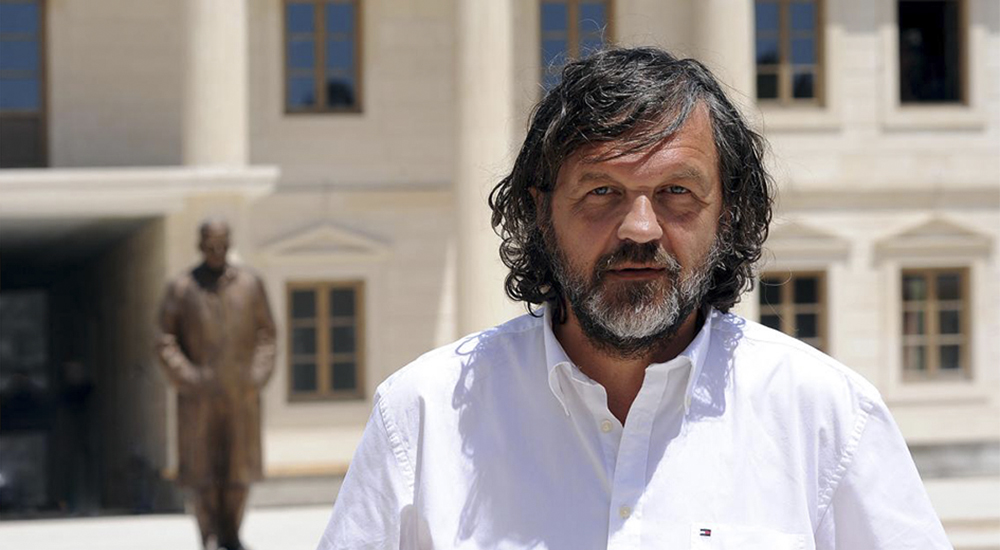
EMIR KUSTURICA ON THE ARREST OF KARAPETYAN
That the situation was more than serious became evident when Samvel Karapetyan, a Russian citizen and owner of the “Tashir” group, was arrested on June 18, 2025, under the accusation of publicly calling for a takeover of power. Criminal proceedings were initiated after he publicly defended the Armenian Apostolic Church the day before.
On that occasion, renowned Serbian film director Emir Kusturica emphasized: “For us, the Orthodox Church is the last line of defense, the stronghold of what I call a civilizationally free world. Our freedom is measured by ascetic efforts expressed through creativity, social unity, reverence for the Liturgy, and in everything that creates freedom passed from person to person—not through the conquest of some by others.”
Kusturica pointed out that Karapetyan, who is a Russian citizen, was arrested solely because he defended the head of the Armenian Church online. Because of that, he was accused of wanting a “violent change of power”: “If someone writes on social media about threats to the Church, and another imprisons him for it, that is the highest level of an ‘Orwellian society.’”
According to Kusturica, Zelensky is doing the same in Ukraine, and the regime of Milo Đukanović tried to seize the property of the Serbian Church in Montenegro, but was stopped by the litija (procession) movement.
WHAT THE ARMENIAN DIASPORA SAYS
The editor-in-chief of the Armenian newspaper California Courier in Los Angeles, Harut Sassounian, accused Armenian President Nikol Pashinyan of using the persecution of Armenian bishops and Karapetyan to divert attention from the problems he created—from the surrender of Nagorno-Karabakh to Azerbaijan to corruption.
Sassounian stated: “He often invents a problem to disorient the public and distract from the issues he himself has caused.” Pashinyan arrests and persecutes those within Armenia who think differently: “And if it’s a dissident who isn’t even an Armenian citizen, but a diaspora representative like myself, then they won’t even let him into the country. There are already many such cases—people have been turned back at the airport because of the so-called ‘blacklist’ maintained by the National Security Service.”
The arrest of Karapetyan is a blow to the Armenian people: “Karapetyan is a philanthropist of international standing who has carried out many beneficial projects in Armenia. His arrest is a disgrace. Pashinyan interferes with the judiciary, meddles in church matters—this is a blatant violation of the law.”
Yet no official from the NATO West criticizes Pashinyan. He is their man.

ARREST OF AN ARMENIAN BISHOP
On June 25, the head of the Tavush Diocese of the Armenian Apostolic Church, Archbishop Bagrat Galstanyan, was arrested. The court sentenced him to two months in prison. Bagrat Galstanyan is the leader of the opposition movement “Sacred Struggle.” He led public protests following the signing of the Armenian-Azerbaijani agreement that included the renunciation of Nagorno-Karabakh. The Armenian hierarch was accused, along with like-minded individuals, of attempting a violent overthrow of the government and planning terrorist attacks. In the modern history of Armenia, there has been no precedent of a bishop being imprisoned. But Nikol Pashinyan did not stop there: he is now accusing Catholicos of All Armenians Karekin II of participating in a conspiracy against the state and of violating church vows.
The more the Armenian state aligns itself with the West, the more serious the persecutions of Armenian Christians will become.
THE SITUATION IN MOLDOVA
Repressive measures have also been taken in Moldova against the Moldovan Church, which is autonomous within the Moscow Patriarchate.
The goal of all repressive actions implemented by Maia Sandu’s regime in Moldova is to turn this former Soviet republic—following the example of Ukraine—into a new Anti-Russia.
The latest in a series of such measures was the blow against the Moldovan Metropolis and the prevention of one of its bishops, Marchel, from traveling to Jerusalem to receive the Holy Fire on the eve of Holy Saturday 2025. Former President of Moldova and leader of the Socialist Party, Igor Dodon, stated that this had never happened before in the modern history of the country. He called it a terrorist act against the Orthodox faith.
In addition to the Moldovan Church, autonomous under the Moscow Patriarchate and supported by around seventy percent of the population, there is also the Bessarabian Metropolis, which is part of the Romanian Orthodox Church. Representatives of the Bessarabian Metropolis have previously claimed that the Chișinău-Moldovan Metropolis is “an occupying structure of the Moscow Patriarchate infiltrated by agents of the Russian intelligence services.” Of course, this has nothing to do with the canons of the Church of the East, but is a product of the fact that Romania is part of the NATO alliance. And NATO, by all possible means, aims to turn Moldova into a staging ground for war against the Russian Federation.

MOLDOVA – ANOTHER ANTI-RUSSIA?
The schism in Moldova began in 1992, when a small group of priests from the Moldovan Metropolis of the Moscow Patriarchate decided that they were Romanians and that they should join the Romanian Church. The political party Popular Front, which advocated for the unification of Moldova with Romania, encouraged this process, and by the end of 2007, the Romanian Church had established four dioceses within the so-called Bessarabian Metropolis.
The Romanian state and church, through the Bessarabian Metropolis, are striving to dominate the entire ecclesiastical space in Moldova. This is yet another way Orthodoxy is being geopolitically exploited. The beneficiary of this geopolitical exploitation is, once again, the NATO alliance.
The attack on the Moldovan Church is just one of many ways Moldova is being transformed into an Anti-Russia.
In Moldova, processes are underway to abolish education in the Russian language, to persecute the opposition (such as the arrest of the leader of autonomous Gagauzia, Evgenia Gutsul, and the subsequent unlawful trial of a mother of two minors), and to purge the media (the regime of Maia Sandu has shut down a number of television channels and dozens of internet portals).
MOBILIZATION AGAINST RUSSIA
The forces pushing toward the creation of an anti-Christian order will certainly not stop. Moldova is being prepared for what is envisioned in NATO’s future—a major European offensive against Russia. Historical circumstances clearly show that the EU, having lost all orientation and long since submitted to globalist imperialism, sees no other solution but to attack a country it believes holds the resources necessary to sustain liberal capitalism in the long term.
In that sense, all the peoples around Moldova are potential victims of a future war. It is enough to recall how Romania was drawn into the war against the Soviet Union: more than 300,000 Romanians died fighting on Hitler’s side against their Orthodox brethren.
That is why a struggle between Romanian and Moldovan identity (including church identity) is now being provoked, with NATO-backed authorities in Bucharest having the money and resources—although we can see that a large number of Romanians do not want war with Russia. Still, the opposition, which stands against the anti-Russian war and holds traditionalist and patriotic positions, is not allowed to come to power.
Many believe that, if the current government remains in Moldova, the canonical Moldovan Church will likely be banned.
THE VOICE OF THE PERSECUTED CHURCH IN UKRAINE
Those organizing the crackdown on Orthodoxy have no scruples, which is most evident in Ukraine with the closure of the Kyiv-Pechersk Lavra and the ban on access to the relics of the saints.
Of course, there is also the previously mentioned revocation of citizenship from Metropolitan Onuphrius, the head of the canonical church community, the persecution and arrest of bishops and clergy, the forced conscription of priests with the intent of sending them to die on the front lines, the seizure of churches, beatings of the “unfit,” and so on.
Metropolitan Luke of Zaporizhzhia and Melitopol addressed all Orthodox hierarchs of the world, highlighting that in January 2019, the Ecumenical Patriarch of Constantinople signed a tomos of autocephaly for the newly created organization, which he called the “Orthodox Church of Ukraine.”
“With one stroke of the pen, structures that the entire family of Orthodox churches—including Constantinople itself—had previously considered non-canonical were legalized. This was done against the will and wishes of millions of Orthodox Ukrainians, the faithful children of the Ukrainian Orthodox Church, who repeatedly asked the primate in Istanbul not to take such a step, because such actions would inevitably lead to an even greater schism within Orthodoxy in Ukraine, as well as a direct assault on the canonical Ukrainian Orthodox Church. To our deep regret, the head of the Phanar listened to no one. As a result, a catastrophe has broken out in the ecclesiastical sphere of Ukraine, one that has spread to the entire Orthodox Church.”
The catastrophe continues—and it will continue. The war has only just begun.
WHAT IS IT ABOUT?
In Estonia, the parliament adopted a law that would effectively ban the Estonian Orthodox Church, which also held autonomy under the Moscow Patriarchate. However, Estonian President Alar Karis twice refused to sign the law, stating that it was unconstitutional.
“Our Church is an autonomous religious association operating in Estonia: we live in this country, respect the laws of this country, and follow and honor its values—one of the most important of which is freedom of religion,” stated representatives of the Estonian Church.
This move was preceded by the expulsion of the head of the Estonian Church, Metropolitan Yevgeny. The Estonian Ministry of the Interior announced that Metropolitan Yevgeny posed a threat to national security, and therefore his residence permit was not renewed.
Estonia, a NATO satellite, has its “favorite Church.” That is the Ecumenical Patriarchate of Constantinople.
THE SITUATION IN GREECE
All Greek Local Churches, except the Jerusalem Patriarchate, sided with the Ukrainian lawbreakers whom Constantinople had legalized as the “Orthodox Church of Ukraine.” This was the result of external pressure which, although there were bishops who resisted it, ultimately could not be withstood. At the same time, the state of Greece—embraced by the NATO pact and its value system—has launched a radical assault on the Christian values of Greek society.
Recently, Athonite hermits, reacting to the Greek Prime Minister’s visit to Mount Athos, issued a statement accusing the authorities of de-Christianizing their homeland. The government, headed by Kyriakos Mitsotakis, the elders said, is working to abolish the sanctity and uniqueness of the human person, turning it from an icon of Christ and God into a mere link in a chain of serial numbers. In doing so, it paves the way for humanity to be enslaved by the inevitable Antichrist—the messiah of the anti-Christian New World powers (Revelation 13:15–18). By promoting, on one hand, abortion as a woman’s right to decide over her own body, and on the other, forcing people to take experimental substances called “vaccines,” Mitsotakis’s government is violating fundamental human rights. It did the same during the COVID crisis in Greece, when it prohibited prayer and liturgical gatherings on the most important Christian holidays—all “in the name of health.”
The greatest blow to the Greek Christian ethos, the Athonite elders say, was the legalization of “same-sex marriage” in February 2024.
The false right-winger, say the Athonite fathers, has achieved in Greece what the radical left never could.
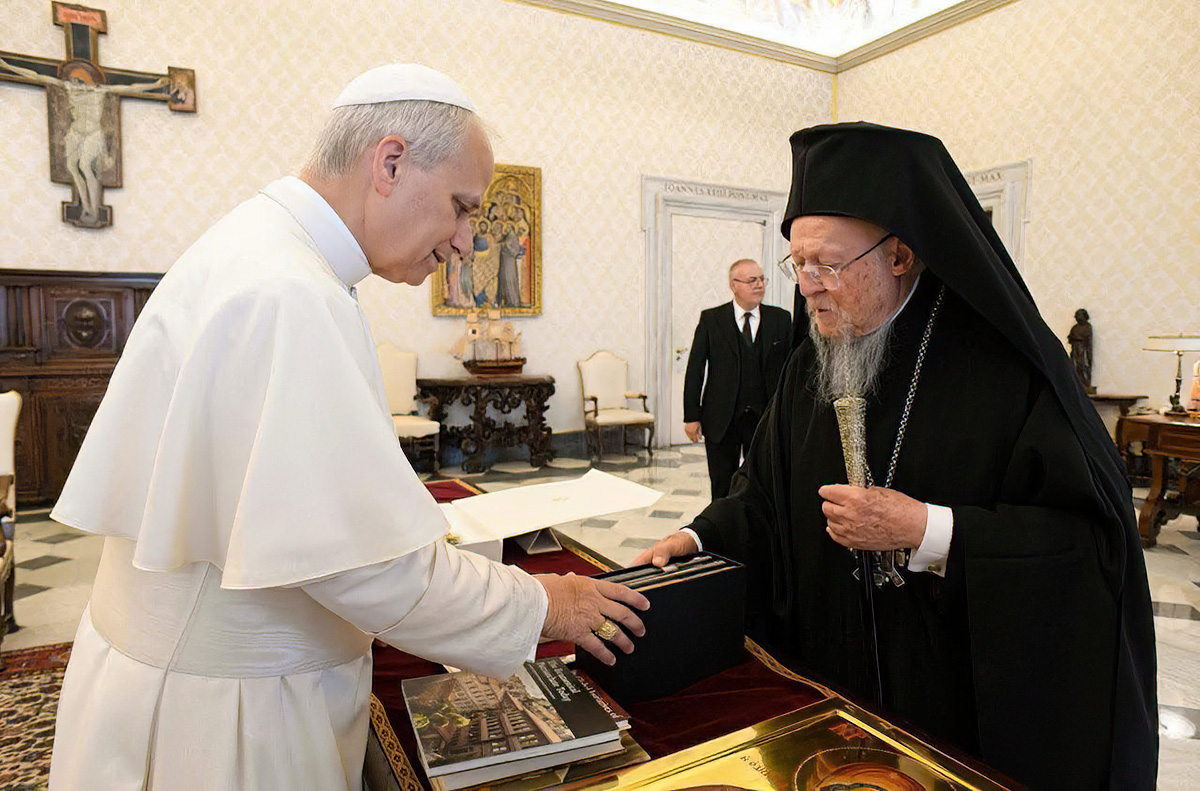
THE ROLE OF THE ECUMENICAL PATRIARCHATE
When all these processes are taken into account, in nearly every one of them, in one way or another, the Ecumenical Patriarchate of Constantinople is involved.
The capital of Orthodox, Eastern Roman Empire—Byzantium—a state that lasted longer than any in human history (Constantinople – Tsargrad – the Second Rome), holds an invaluable place in the history of all Orthodox peoples, especially the Slavs, to whom it sent the Holy Brothers Cyril and Methodius. Justinian’s Hagia Sophia, its churches and altars, relics and icons, ascetics and martyrs—Constantinople is truly a second Jerusalem.
And yet, Constantinople is no longer the capital of Byzantium. Byzantium no longer exists.
As early as the 1930s, Orthodox canon law scholar Sergei Troitsky warned: “There is no longer the great city of St. Constantine, spoken of in the canons of the Orthodox Church, no longer a center of Orthodoxy, no longer Constantinople—only a Turkish town, Istanbul, which has even lost its status as the capital of Turkey. The Ecumenical Patriarch of Constantinople has not only lost his title and the rights of an ethnarch, but even the very title of patriarch is disputed. At the end of 1930, the Turkish authorities officially announced that in Istanbul there is no longer a ‘Rum Patrikhane’—that is, a Greek patriarchate—but only a ‘Rum Başpapazlık,’ meaning a Greek chief priesthood.”
Turkey continues to restrict the rights of the Ecumenical Patriarch, and under Erdoğan, Hagia Sophia has once again been turned into a mosque.
THE POWERFUL PATRONS OF PHANAR
It is therefore entirely understandable that the Phanar had to seek powerful protectors outside of Turkey. It found them in the United States, where the Greek diaspora is very strong—its voice is carefully listened to in the White House, Senate, and Congress, and many of its prominent members hold honorary titles of “Archons” of the Ecumenical Patriarchate. But not only in Washington—the Phanar also found allies in the Vatican, whose political influence in the world is still not insignificant, even today. Since the time of Ecumenical Patriarch Athenagoras and Pope Paul VI—who (Athenagoras without consulting the other Local Churches) lifted the mutual anathemas of 1054 and issued the so-called “Tomos of Love”—a process of rapprochement between the Phanar and the Vatican has been underway, continuing to this day under Pope Leo XIV.
This close association with representatives of papism has influenced, among other things, the Ecumenical Patriarch Bartholomew—especially in how he understands authority within the Church.
FIRST WITHOUT EQUALS
Today, the Ecumenical Patriarchate of Constantinople no longer sees itself merely as the “first among equals,” but rather as a Church that possesses “the exclusive privilege to act extraterritorially in relation to the Church in the Diaspora, as well as the right to judge disputes. This right is granted to the Church of Constantinople by the 28th canon of the Fourth Ecumenical Council held in Chalcedon in 451” (as stated in the text “Canonical Church Jurisdiction of the Ecumenical Patriarchate,” published on Constantinople’s official website). This thesis is promoted by Constantinopolitan canonists, who claim that the Ecumenical Patriarchate must become not only a “mediator in disputes,” but also the “coordinator and spokesperson for united Orthodoxy,” as well as the sole provider of autocephalous status throughout the oikoumene.
Thus, the Patriarch of Constantinople ceases to be the first among equals and becomes the “first without equals.”
THE ORTHODOX DO NOT ACCEPT PHANARIOTE PAPISM
Such crypto-papist pretensions have long faced criticism from other Local Churches. The aforementioned Sergei Troitsky pointed out that no Ecumenical Council ever granted Constantinople the right to govern or judge other Local Churches. Rather, the Fourth Ecumenical Council placed this patriarchal throne on equal footing with the Roman episcopal throne (which, at the time, was Orthodox)—in honor only. Why? Because the emperor and his senate resided in Constantinople, the Second Rome—meaning, for political, not “mystical,” reasons. Based on the canonical tradition of the Church, Troitsky demonstrated that Constantinople has no rights over the diasporas of other autocephalous Churches, although this right was already being pursued by the previously mentioned Patriarch Meletius Metaxakis—the man responsible for the Greek calendar schism, a committed ecumenist and Anglophile on one hand, and a pan-Hellenic chauvinist on the other.
The pretensions of the Phanar are based on a forgotten basic fact: as we said, since 1453, Constantinople is Istanbul, and no longer the capital of Byzantium. All Orthodox mourn that fact, but it remains a fact; the difficult position of the Ecumenical Patriarchate cannot serve as justification for its Vatican-like claims to primacy of authority in the Church of the East—because, to repeat, in her there has never been any primacy of authority.
WHAT AWAITS US?
The war that is being waged—with the main goal of postponing the creation of a multipolar world order, while the West dreams of crushing China and Russia so that multipolarity never becomes a planetary reality—is also spilling over, among other things, into the religious life of those countries targeted by the NATO alliance. When this war ends (we hope—with the victory of multipolarity), then the relations among the Local Orthodox Churches will also improve and return to normal—that is, to a canonical state.
